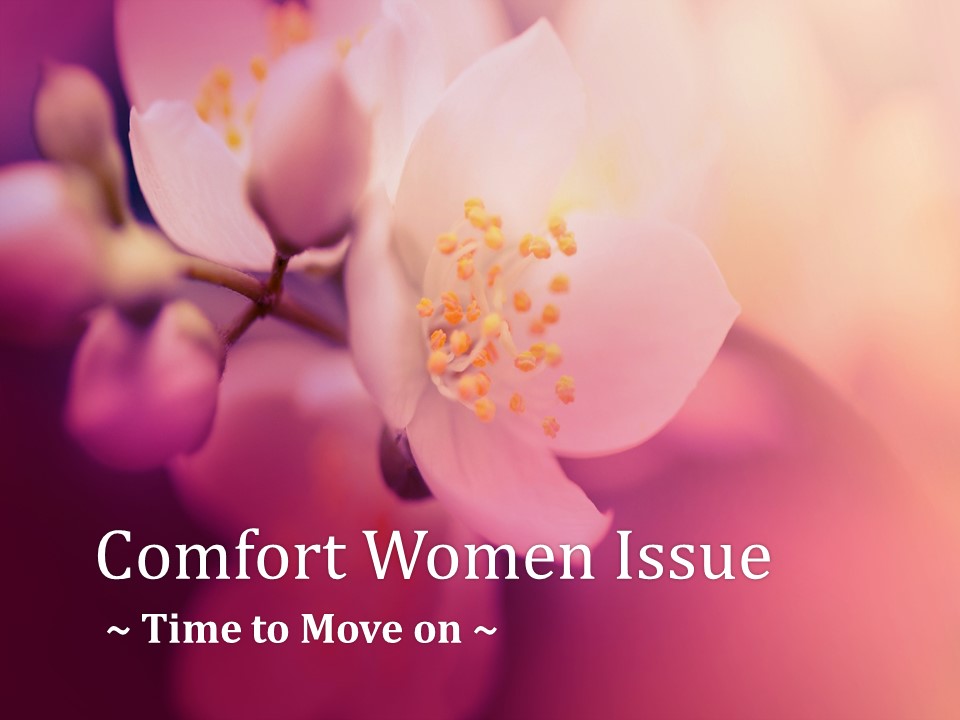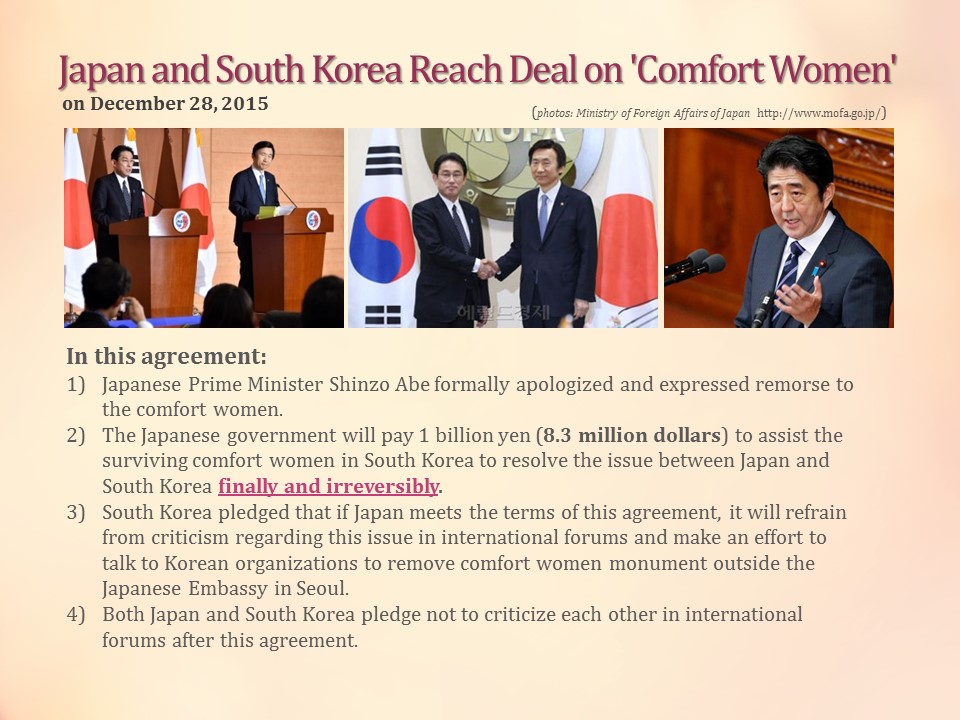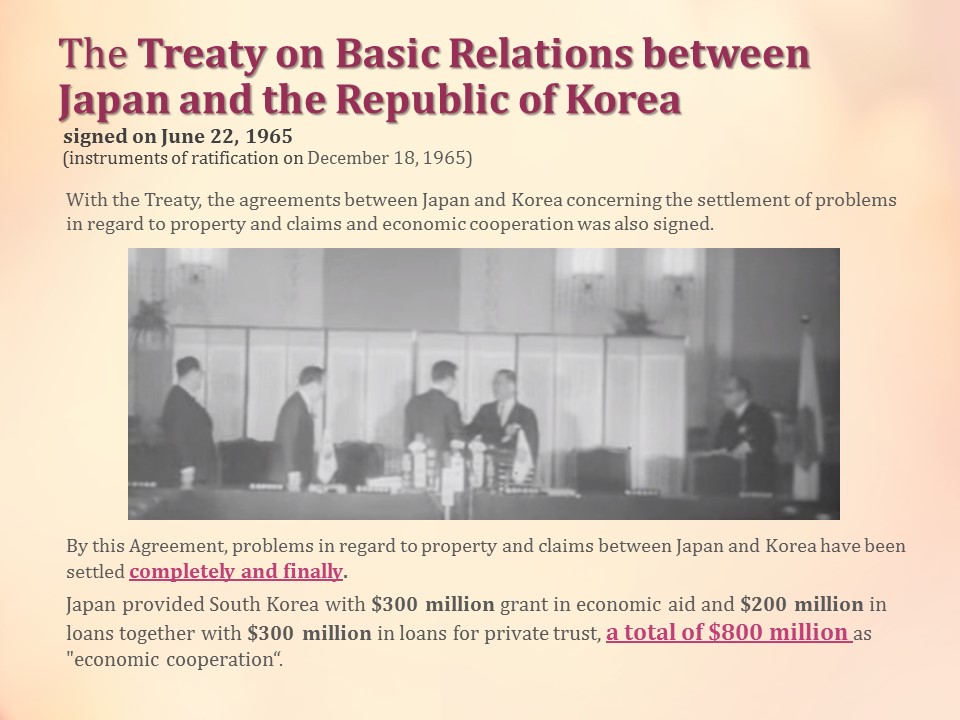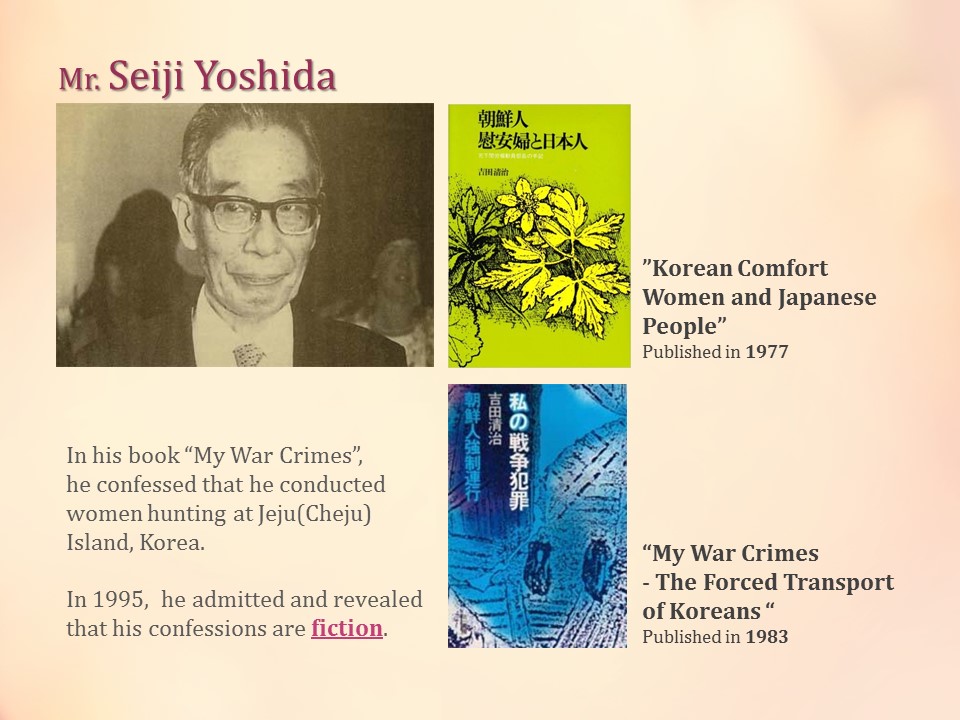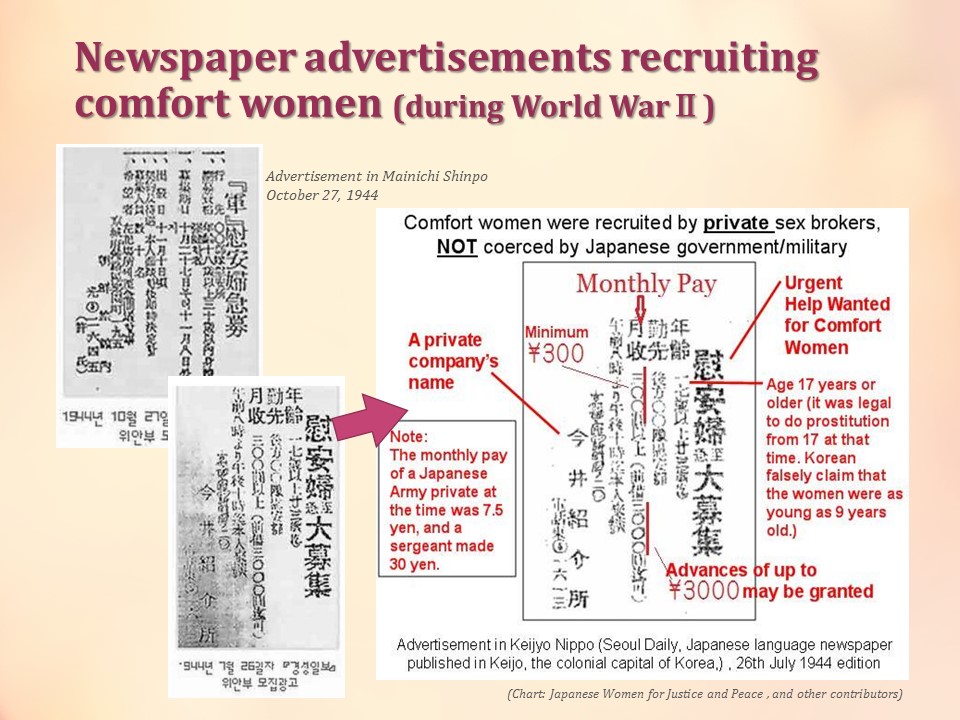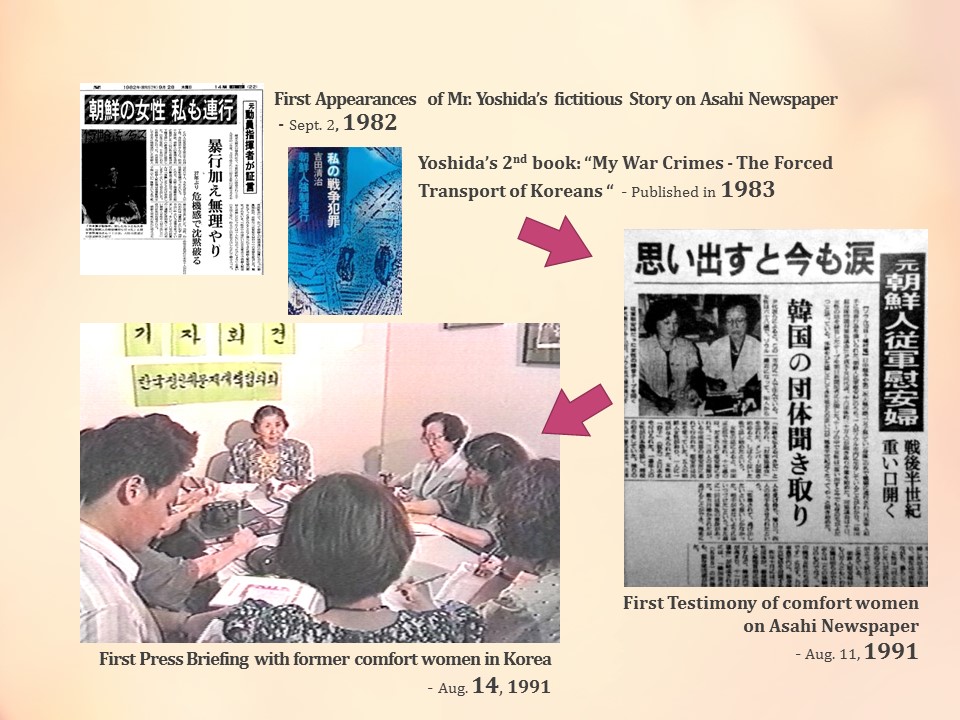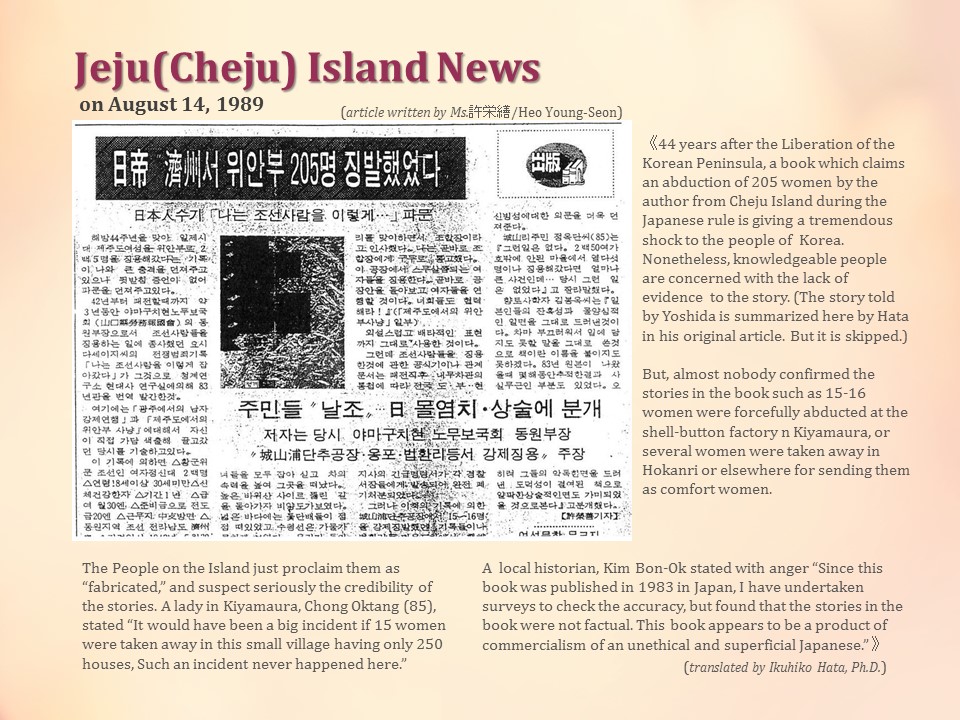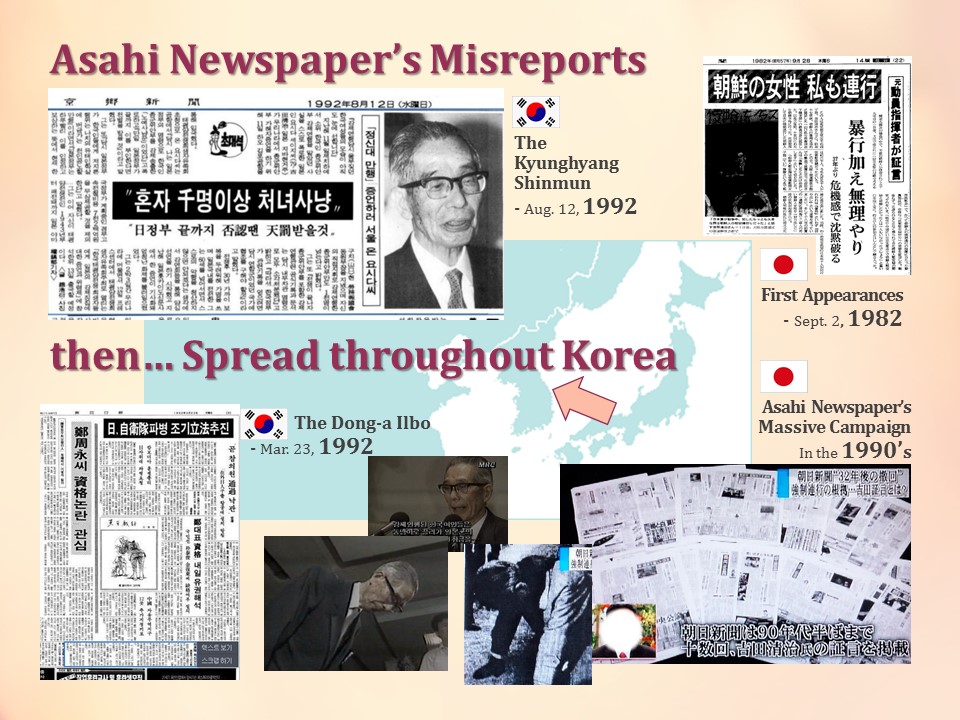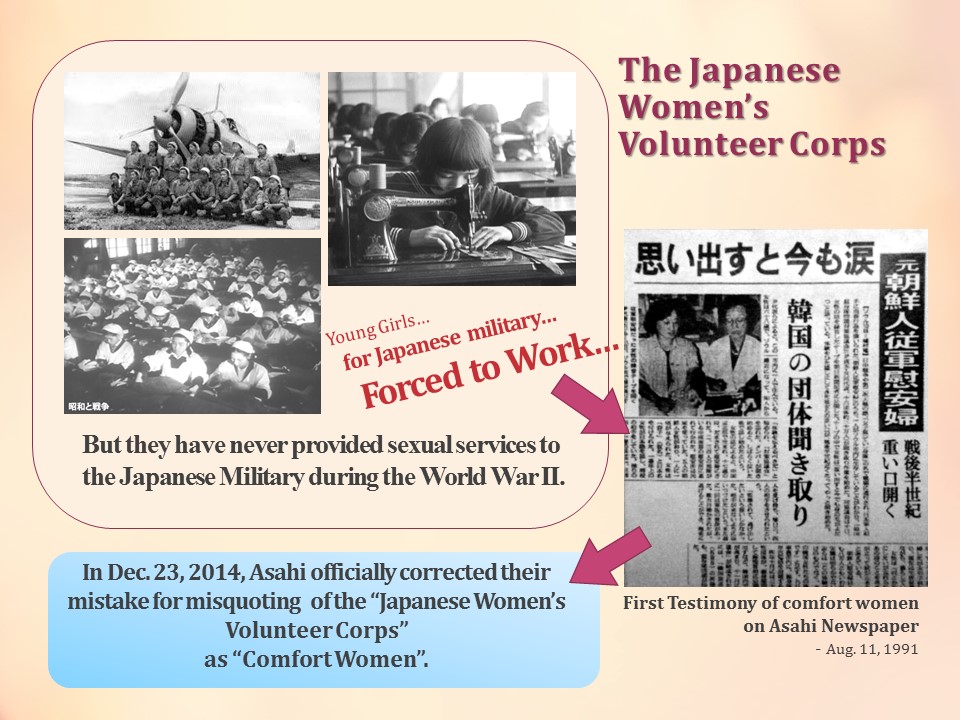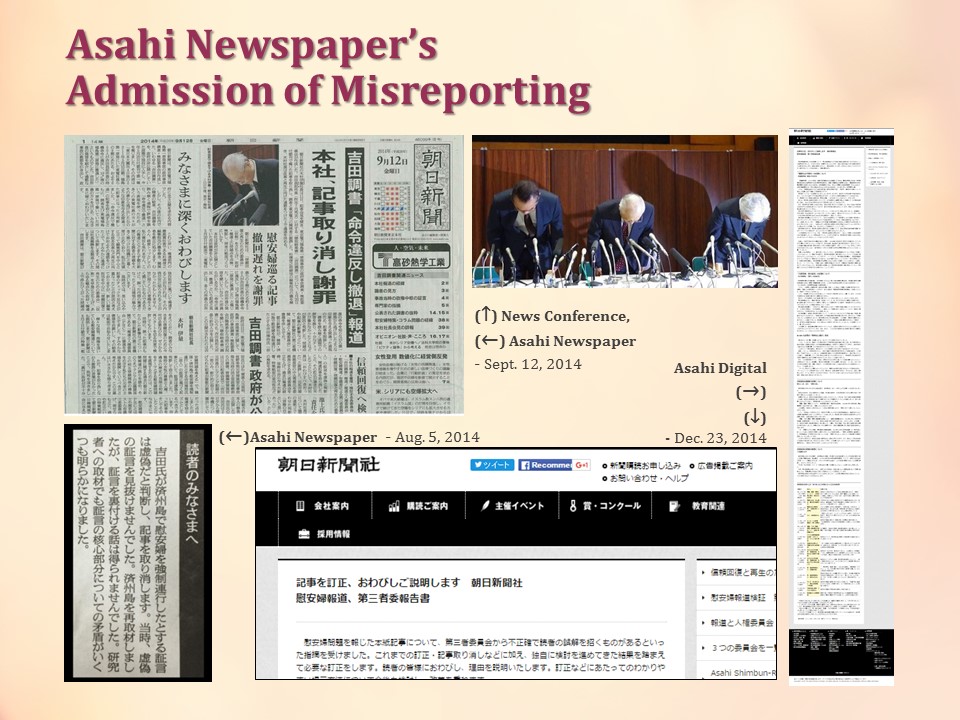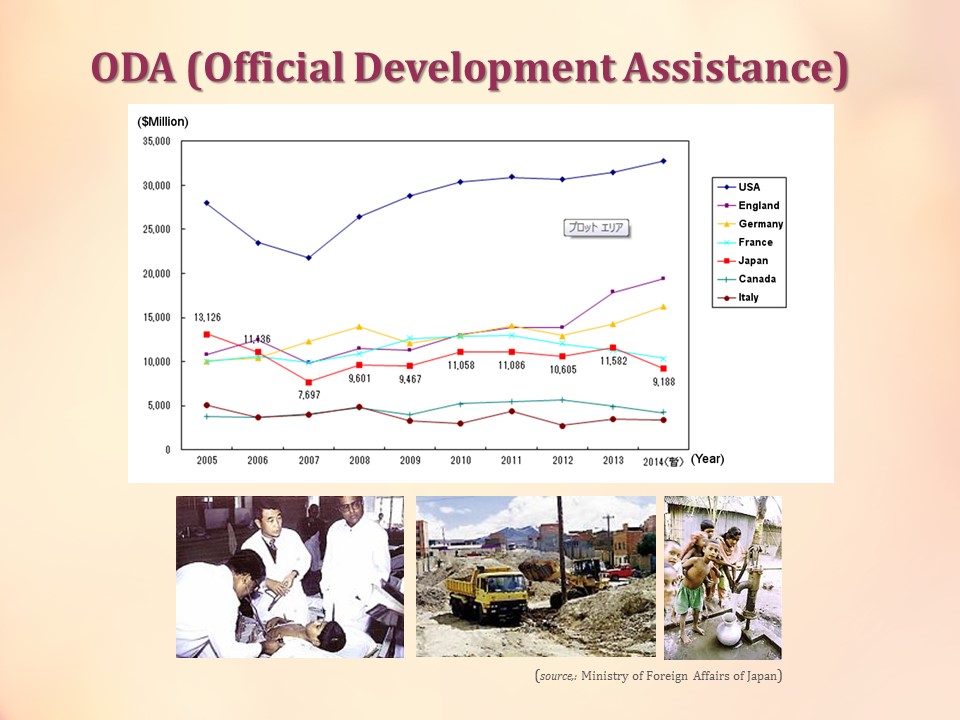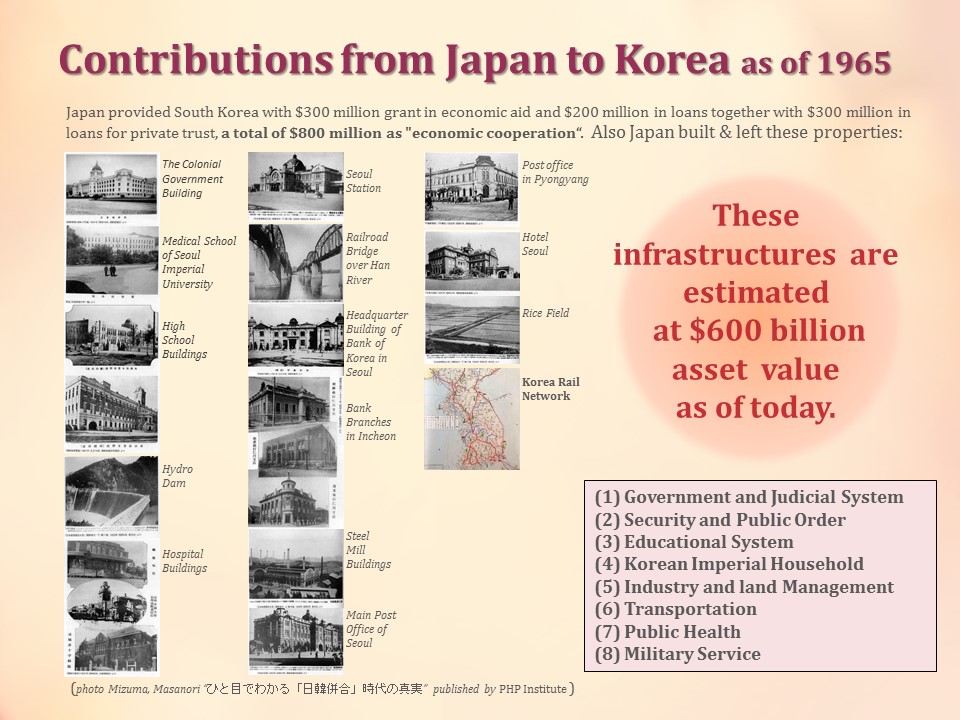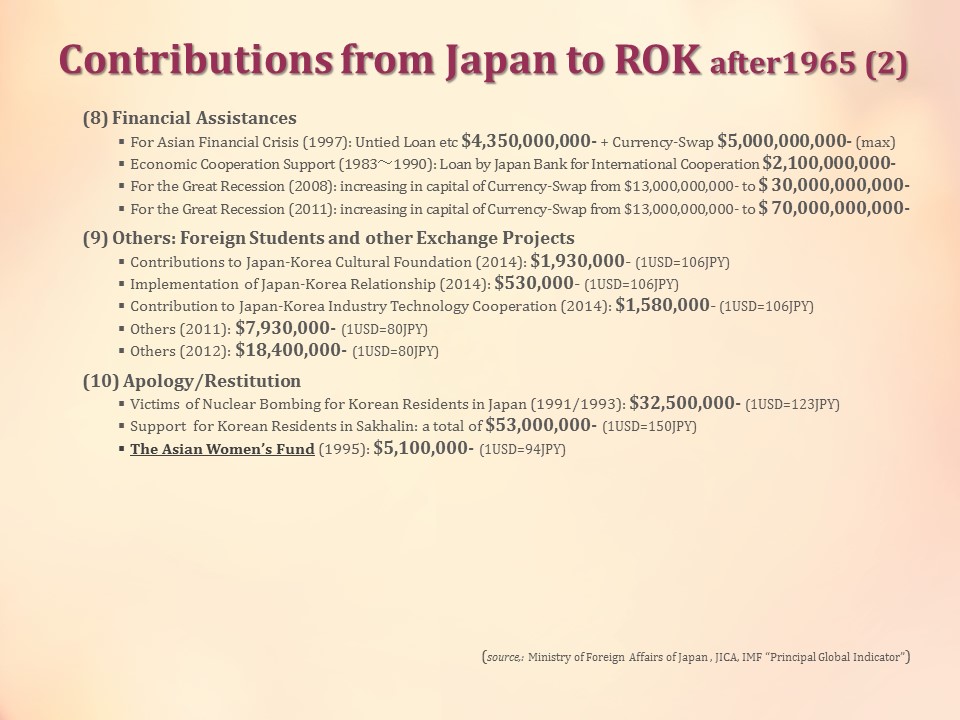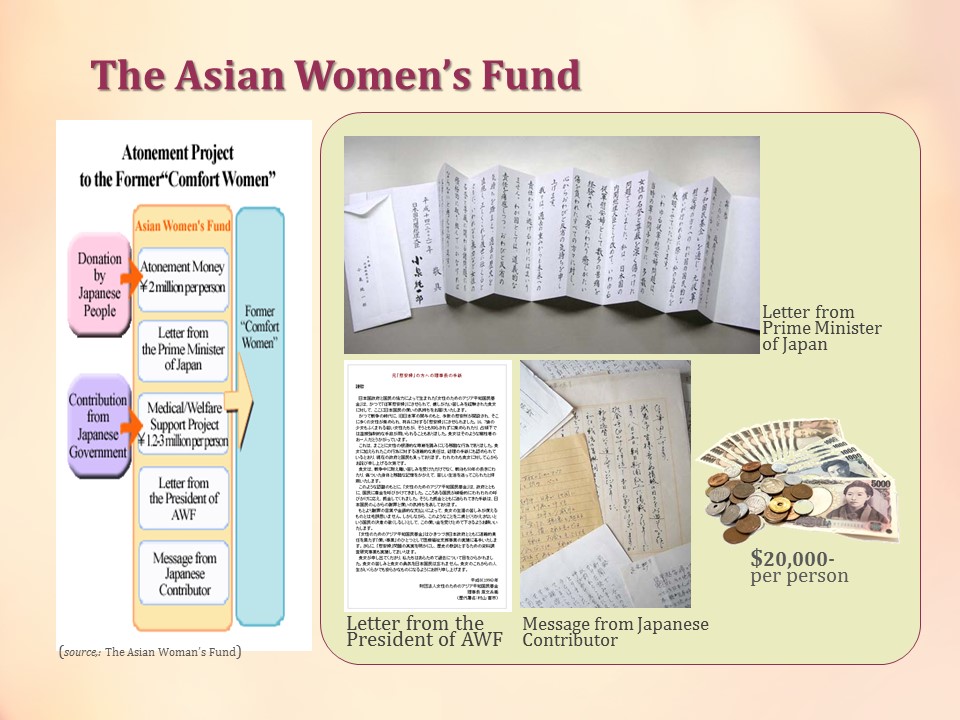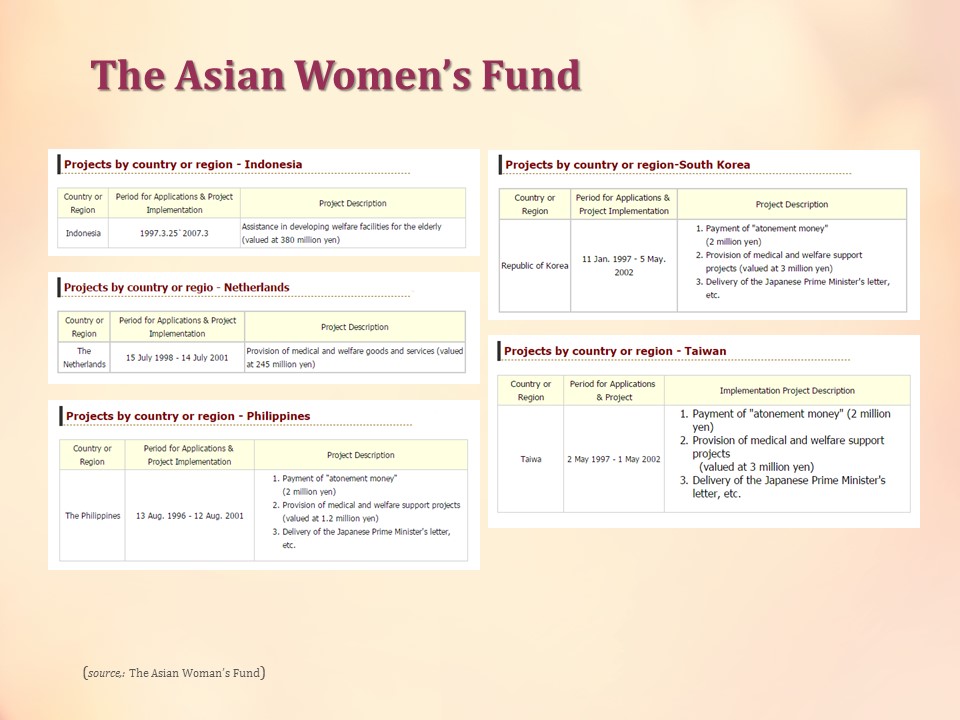************************************************************************************

Time to move on
March 24th.2016
Mieko Greene
On December 28th 2015, a landmark agreement between Japan and South Korea on the long standing comfort women issue was reached in Seoul, South Korea. By this agreement, Prime Minister Abe formally apologized and agreed to pay 1 billion yen (or $8.3million) to the surviving “comfort women” in South Korea to resolve this issue between Japan and South Korea finally and irreversibly.
Although both governments seemed satisfied, there has been some negative response from Korean civic groups. Many Koreans in the United States wish to continue to build memorial statues in America to the comfort women. I’m not here today to criticize any party involved, but I want to add some truth to what’s been told to the world. I hope you’ll consider my points carefully.
Fifty years ago, on December 18th 1965, Japan and South Korea agreed that Japan would compensate South Korea for all damages inflicted by the Japanese military. The treaty required Japan to provide eight hundred million dollars in financial and technological aid. By this Agreement, all claims against Japan by South Korea arising from the Second World War would be deemed paid in full and closed forever.
Yet, decades later, new claims arose against Japan. It all started because of one book. In 1977, a Japanese writer, Seiji Yoshida , published ”Korean Comfort Women and Japanese People” This issue attracted a lot of attention and media coverage.
In 1983, Yoshida published a second book “My war crimes” which was translated into Korean. Yoshida claimed that he had transported 205 Korean women from Cheju Island to provide comfort women for Japanese soldiers. Yoshida insisted everything he had written was true. He claimed he was tormented by his actions in Korea during the Second World War.
Yoshida was praised by the Japanese political left and many people in Korea. Yoshida had been involved for years in politics before his writing career took off. In 1947, he unsuccessfully ran for the city council as a communist candidate in Shimonoseki. He made a living as a writer, but was largely unknown until he wrote about the comfort women.
In 1982, Asahi, one of Japan’s largest newspapers, started printing his story without confirming the facts. In reality, many comfort women had been recruited by brothels through advertising in Japanese newspapers and local Korean newspapers during the Second World War.
After Yoshida’s second book was published, Japanese historians pointed out factual discrepancies between his two books. Even South Korean media began to question their authenticity.
However, soon after his second book was translated into Korean in 1989, ex-comfort women started coming forward claiming they had been victimized.
In the same year, a local paper “Cheju” conducted a full investigation about abduction on Cheju Island. Although a local historian 金 奉玉(Kim Bong-ok) and a female reporter 許栄繕(Heo Young-seon) from” Cheju “interviewed local residents, no one could recall any military abduction of young women. On August 14th 1989, “ Cheju “ wrote an article casting grave doubts about Yoshida’s story. Later on, they dismissed his claims.
Nevertheless, Yoshida’s book continued to have an enormous impact among anti-government circles and media. “Asahi” and other publications had already been inclined to believe that Japanese soldiers had been morally corrupt. Those publications gave Yoshida’s book a tremendous amount of coverage, primarily because he validated and fueled their own beliefs. Yoshida even enhanced his reputation by going on a pilgrimage to Korea to beg for forgiveness. Some National Diet representatives for whom “Asahi” is the font of wisdom came to believe Yoshida’s claims of his having being a human trafficker.
Throughout the 1980s and 1990s, Asahi repeatedly reported Yoshida’s accounts. By continuing to spread this story Asahi probably convinced many Japanese and Koreans that the Japanese military had abducted Korean women on Cheju Island.
When the Japanese government held hearings in 1993, scores of women testified. The government found the testimony to be inadequate. This led to tirades of criticism against the Japanese government by a left wing journalist and a lawyer in the early 1990’s.
Asahi printed an article on August 11th 1991 that led people in South Korea to confuse “the Japanese Women’s Volunteer Corps” with the comfort women. As a result, many people came to believe that the comfort women included very young girls.
Instead of responding appropriately, the Japanese officials repeatedly apologized to calm down protests coming from South Korea. In 1996, faced with negative results in the investigations conducted by both Japanese and Korean historians, Yoshida finally confessed that his stories had been fabricated. Unfortunately, even after Yoshida’s confession, Asahi waited years before admitting its mistake.
On December 23rd 2014. after decades of supporting Yoshida, “Asahi” at last admitted Yoshida had not told the truth and retracted all its earlier articles over the comfort women issue. However, years of repeated media coverage and delayed admission of a mistake by one of Japan’s leading newspapers had convinced many people that a grave wrong had been perpetrated on Korean women by the Japanese military.
Nevertheless, Japan continues to demonstrate sincere atonement by helping countries affected by Japanese militarism. The number of recipients of Japan’s ODA extends to over 100 countries today, most of which were never involved in the Second World War.
Even though Japan provided South Korea in 1965 with 800 million dollars in financial aid, more than twice the national budget of South Korea at that time, Japan still assists South Korea financially.
In the 1970’s, Japan financed South Korea’s first subway. In the1980’s, Japanese loans enabled Koreans to finish the Seoul subway network. Even today, Japan provides South Korea with a stream of economic and technological assistance and cooperation.
After 1995 the Japanese government sponsored “the Asian Women’s Fund or “AWF “ to express Japanese people ’s compassion towards ex- comfort women. An advertisement placed in 6 major newspapers by the Japanese government in 1995, seeking private donations for ex-comfort women led Japanese citizens to donate 5 million dollars. This fund continued to run until March 31st. 2007.
From 1996 to 2001, the Japanese government ran the Medical and Welfare Support Project for AWF to fulfill its responsibility for military wrongs committed in South Korea, Taiwan, Philippines, Indonesia, and to Dutch nationals who had been living in Indonesia. By the 1990’s, Japan became the largest provider of foreign aid and remains the fifth largest donor of foreign aid in the world today.
Yet, no matter how sincerely Japan strives to make up for past wrongdoings, Japan remains haunted by incessant accusations over the comfort women. What is being said about Japan on this issue in the international community is not true. It’s giving the impression that Japan today is an international villain.
On the contrary, today’s Japan is a free and democratic society that is no threat to any other nation. Japan’s constitution bars militarism and its self-defense forces are forbidden from launching aggressive war against foreign countries. All they can do is protect Japan from invasion. Today, Japan is one of the most peaceful countries in the world.
Since the militarist Japan is long dead, what is the point of placing comfort women monuments in American parks? They have nothing to do with American history and American culture. They don’t belong on US soil.
The continuing monument campaign not only damages the reputation of peaceful and democratic Japan, but it also endangers the security and safety of Japanese Americans and their children who had nothing to do with the comfort women issue. The monument campaign if continued, has the potential for causing more conflict between Japanese Americans and Korean Americans.
The past can place terrible burdens on nations. Japan’s sincere efforts to compensate for past wrongs and to promote world peace must not be nullified over and over again. Let us put this burden behind us. It’s time to move on.
Thank you.
************************************************************************************
The UN Commission on the Status of Women( CSW60 ) Parallel Event
Women’s Rights under Armed Conflict – Japan’s Approach to Respect Women -
The Church Center for the United Nations, NY
12:30pm to 14:00pm, 24th of March, 2016
Sponsor:Japanese Women for Justice and Peace
